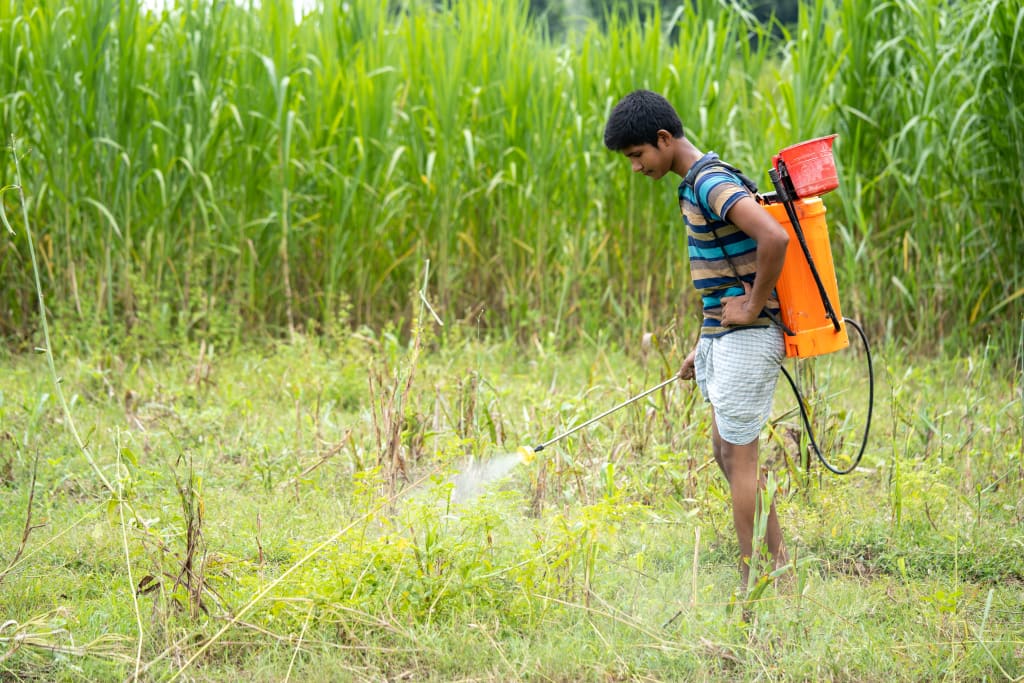Effects of Pesticides on human health and their mitigation measures
Pesticides use and their affects

Introduction:
Pesticides are substances or mixtures of chemicals designed to control or eliminate pests that can damage crops, harm livestock, transmit diseases, or pose a threat to human health. The primary use of pesticides is in agriculture, where they play a crucial role in protecting crops from pests such as insects, weeds, fungi, and rodents. However, pesticides are also used in other sectors, including public health, forestry, and industrial settings.
Despite of benefits of pesticides, they are harmful to humans and the environment. A myriad of chemicals is environmentally stable, bioaccumulative, and toxic. Since some pesticides can remain in the environment, they can persist for many years. Environmental pollution or occupational use can expose the general population to pesticide residues, including physical and biological breakdown products present in the air, water, and food.
Pesticides are substances or mixtures of chemicals designed to control or eliminate pests that can damage crops, harm livestock, transmit diseases, or pose a threat to human health. The primary use of pesticides is in agriculture, where they play a crucial role in protecting crops from pests such as insects, weeds, fungi, and rodents. However, pesticides are also used in other sectors, including public health, forestry, and industrial settings. Here are some specific uses of pesticides: It's important to note that while pesticides offer significant benefits in terms of protecting crops, public health, and other areas, their use should be regulated and managed carefully to minimize adverse impacts on the environment, non-target organisms, and human health. Sustainable and responsible pesticide use, integrated pest management practices, and exploring alternative pest control methods are crucial for balancing the benefits and risks associated with pesticide use.
Use of pesticides:
Insecticides are used in a variety of ways, including increasing crop yields, controlling vector diseases, and killing or suppressing dangerous pests. However, the hazards of pesticides cannot be ignored.
Insecticides are used to control pests of agricultural and public health importance, and they will continue to be used for food security and vector control in the future. Additionally, insecticides are used in homes to fumigate structural pests and to control household pests using aerosols or sprays. Pesticides are difficult to eliminate in the short term, but they should be used with caution.
Pesticide affects:
Pesticides are poisonous, and unfortunately, pesticides don't just harm the "pests" they target. They are toxic, and exposure to pesticides can have multiple health effects. They have been linked to a range of serious diseases, from respiratory diseases to cancer. As they cause significant damage to both the environment and humans, they can damage water and soil quality, thereby causing dangerous effects on animals, birds, plants, and humans. Most pesticides are potentially toxic to humans and can cause serious health consequences, including cancer. Pesticides also damage biodiversity and sustained direct or indirect exposure.
Mitigation measures:
It's important to note that while pesticides offer significant benefits in terms of protecting crops, public health, and other areas, their use should be regulated and managed carefully to minimize adverse impacts on the environment, non-target organisms, and human health. Sustainable and responsible pesticide use, integrated pest management practices, and exploring alternative pest control methods are crucial for balancing the benefits and risks associated with pesticide use.
- There are various ways to mitigate the effects of pesticides on the body Pesticide effects can be minimized by using safer pesticides and handling methods. Many different kinds of pesticides have negative effects on the environment as well as human health. Some examples of these dangerous types of pesticides include methyl bromide, chlorpyrifos, malathion, and diazinon.
- The pesticide should be applied by the trained and experiment man and he should use PPE before handling of pesticide.
- Biopesticides should be used to control pests.
- Pests should be controlled by physical methods.
- Recommended doses of poisons should be used and banned poisons should not be used.
- Do not use such chemicals that have long-lasting effects.
About the Creator
Qadeer Khan
Welcome to my Vocal Media profile! I'm Abdul Qadeer a professional freelancer. My goal is to provide valuable information that can help others grow. Thank you for visiting my profile, I hope you find my content informative and engaging.
Enjoyed the story? Support the Creator.
Subscribe for free to receive all their stories in your feed. You could also pledge your support or give them a one-off tip, letting them know you appreciate their work.






Comments
There are no comments for this story
Be the first to respond and start the conversation.